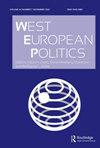The intra-party bargain over ministerial appointments: how party leader performance affects the ‘partyness’ of government
IF 3.6
1区 社会学
Q1 POLITICAL SCIENCE
引用次数: 0
Abstract
Abstract In parliamentary democracies, the logic of delegation from voters to government requires that political parties control government actions. Recruiting government personnel through the party organisation is the primary mechanism for parties to retain such a dominance over the government. Existing research has examined secular trends and cross-sectional variance in ministers’ party ties, mostly focussing on appointments of party members to government office. By contrast, this article centres on the appointment of members of the party elite as a yardstick for party control over government. It explores short-term variance in the ‘partyness’ of appointments, arguing that performance-related shifts in the intra-party power balance condition party elites’ access to ministerial office. Utilising data on ministerial appointments in Austria (1945–2017; n = 603), the article demonstrates that successful party leaders can relax party control by minimising appointments of party elite members, while relatively unsuccessful leaders have to compensate party elites with government jobs.党内部长任命谈判:党的领导人表现如何影响政府的“党派性”
在议会民主制中,选民向政府授权的逻辑要求政党控制政府的行为。通过党组织招募政府人员是政党保持对政府的这种支配地位的主要机制。现有的研究考察了部长政党关系的长期趋势和横截面差异,主要集中在政府部门党员的任命上。相比之下,本文关注的是党内精英成员的任命,以此作为党对政府控制的衡量标准。它探讨了任命的“党派性”的短期差异,认为党内权力平衡中与绩效相关的转变是党内精英进入部长职位的条件。利用奥地利部长任命数据(1945-2017);N = 603),这篇文章表明,成功的政党领导人可以通过最小化党内精英成员的任命来放松党的控制,而相对不成功的领导人必须用政府工作来补偿党内精英。
本文章由计算机程序翻译,如有差异,请以英文原文为准。
求助全文
约1分钟内获得全文
求助全文
来源期刊

West European Politics
POLITICAL SCIENCE-
CiteScore
10.00
自引率
7.10%
发文量
58
期刊介绍:
West European Politics (WEP)has established itself as one of the most authoritative journals covering political and social issues in Western Europe. It has a substantial reviews section and coverage of all national elections in Western Europe. Its comprehensive scope, embracing all the major political and social developments in all West European countries, including the European Union, makes it essential reading for both political practitioners and academics.
 求助内容:
求助内容: 应助结果提醒方式:
应助结果提醒方式:


